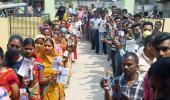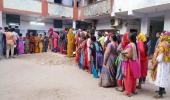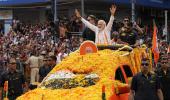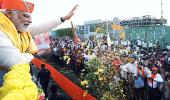'One nation, one election' is not possible under the present Constitution. It requires at least five constitutional amendments'

The Congress on Monday said the idea of 'one nation, one election' was not pragmatic and wondered how long the government would survive by "releasing hot air balloons" to test the waters.
The opposition party's assertion came after reports said the Bharatiya Janata Party-led National Democratic Alliance (NDA) government would implement 'one nation, one election' during its current tenure.
The Congress asserted that there was no draft proposal of 'one nation, one election' and the government had made no attempt to speak to it.
The BJP-led NDA government will implement 'one nation, one election' within its current tenure, sources said on Sunday, exuding confidence that the reform measure would receive support across party lines.
As the third term of the NDA government led by Prime Minister Narendra Modi completes 100 days in office, the sources said the cohesion within the ruling alliance would continue for the rest of the tenure.
Congress leader P Chidambaram said that it is not possible under the present Constitution and requires at least five constitutional amendments.
Chidambaram said Prime Minister Narendra Modi does not have the numbers to place those constitutional amendments either in the Lok Sabha or Rajya Sabha.
Addressing reporters in Chandigarh, Chidambaram said, "'One nation, one election' is not possible under the present Constitution. It requires at least five constitutional amendments."
"Mr Modi does not have the majority to put those constitutional amendments in either in the Lok Sabha or Rajya Sabha," the former Union minister said.
He asserted that there were greater constitutional obstacles to 'one nation, one election'. "It is not possible. The INDIA bloc is totally opposed to 'One Nation, One Election."
In New Delhi, Congress spokesperson Supriya Shrinate said, "You quoted government sources, here I am the official spokesperson of the Congress party laying threadbare the many failures of the Modi government. How long is this government going to survive by leaking selective information?"
"How long is this government going to survive by turning a blind eye to real and actual problems of this nation? How long is this government going to survive by planting information, by releasing these hot air balloons to test the waters? The reality is that there is no draft, the reality is that there has been no discussion, the reality is that there are assemblies in progress, the reality is that the government has made no attempt to speak to us," she said at a press conference.
"It is absolutely not pragmatic to do this but the government has to have a conversation. So these sources-based information, that is what this government has survived on, leak sources-based information, run (it) in news channels, do reportage through WhatsApp, this nonsense must stop but that is what continues and that has continued in the last 100 days," Shrinate said.
'One nation, one election' was one of the key promises made by the BJP in its manifesto for the Lok Sabha elections.
In his Independence Day address last month, the prime minister made a strong pitch for 'one nation, one election', contending that frequent polls were creating hurdles in the country's progress.
A high-level panel headed by former president Ram Nath Kovind in March recommended simultaneous elections for the Lok Sabha and state assemblies as the first step, followed by synchronised local body polls within 100 days.
Separately, the Law Commission is likely to recommend holding simultaneous polls for all three tiers of government -- Lok Sabha, state assemblies and local bodies such as municipalities and panchayats -- starting with 2029 and a provision for unity government in cases of a hung House or no-confidence motions.
The Kovind panel has not specified any period for rolling out simultaneous polls.
It has proposed the creation of an 'implementation group' to look into the execution of the panel's recommendations.
The panel recommended as many as 18 constitutional amendments, most of which will not need ratification by the state assemblies.
However, these would require certain Constitution amendment bills that would need to be passed by Parliament.











 © 2025
© 2025